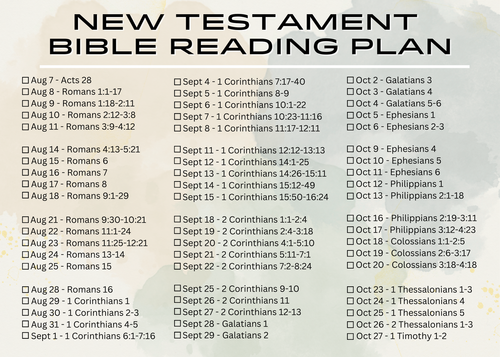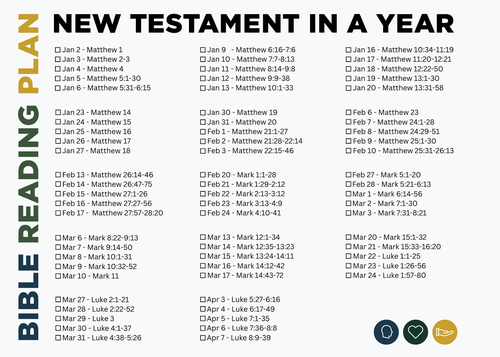Until Christ Is Formed In You
Galatians 4:1-31
In the past, a "guardian" was an adult who governed until the rightful heir to the throne came of age. A "manager" oversaw operations on large estates, often a slave who supervised others. "Date set" refers to a predetermined date with legal implications, like a specific day for tax payments. Paul uses these terms to illustrate the concept of an heir living under authority until a designated time when they would assume control. Christians were once "under a guardian" and "under the law" until Christ. Paul employs slavery and redemption imagery to describe the connection between sin, the law, and the justified curse it imposes on those who disobey. To be enslaved to the law is to be under the just penalty of death it pronounces for violations.
In the perfect moment of history, Paul declares that God "sent forth his Son." When God's Son took on human form, he identified with all humanity, specifically the Jewish people. He was born under the law not because he deserved its curse but because he experienced it, including living in the unjust world that the law warned against due to society's rebellion against God. God sent his Son to rescue those under the law, referring to those under its curse.
Through Christ's redemption, individuals are liberated from the bondage of sin and its consequences. This transformation elevates them from immaturity and slavery to adoption as sons. As adoptive sons of God, Christians are connected with Israel, signifying that Gentile believers in Galatia only need faith in Him to be part of God's people. Believers are united with Christ through the Spirit, sharing an intimate relationship with God. This bond empowers Christ to call upon God as "Abba," like a loving father. If Galatian believers are children of God through faith and their connection to God's Son, they will inherit the promises.
Understanding and embracing the gospel's truth means acknowledging one God, the creator of heaven and earth, revealed through Jesus Christ. Paul cautions against humans leading in their relationship with God, as it is not based on intellectual deductions or complete knowledge. Paul questions why the Galatians would forsake such a gracious connection with God and return to burdensome idol worship. Paul parallels the Galatian believers' preoccupation with adhering to the Jewish calendar and their previous fixation with the non-Jewish religious calendar before accepting the gospel. The Galatians are regressing and desiring enslavement once more.
If the Galatian believers revert to their former state of enslavement, both Paul's suffering and their suffering for the gospel's sake will be in vain. Paul urges the Galatians to imitate him and relinquish the Mosaic law. A physical ailment may have hindered Paul from further travel, leading him to proclaim the gospel in Galatia. The Galatians treated Paul with kindness and respect, like an angel. "blessedness" refers to the joyful fellowship Paul initially had with the Galatians. Speaking the truth to one another, especially regarding the gospel, is a sign of mutual support. Paul has consistently done this since his initial visit to the Galatians. However, somehow, this has also made him their adversary.
Paul often refers to those whose faith in the gospel he has nurtured as his "children." In this passage, he extends the metaphor, envisioning himself as the mother who gave birth to the Galatian Christians. However, he now finds himself going through the pain and danger of labor once again. In the final part of the verse, Paul dramatically shifts the metaphor, imagining the Galatians as pregnant, with a new life forming within them. Through their faith, the Galatians not only dwell in Christ, but Christ, through his Spirit, also dwells in them. Paul intends to continue working with the Galatians until this process reaches maturity.
Paul begins by illustrating this point with a brief retelling of the story of Ishmael and Isaac and the conflict between their mothers, Hagar and Sarah. Hagar, Ishmael's mother, was a female slave, while Sarah, Isaac's mother, was free. Paul suggests that by following the Mosaic law, the Galatians are aligning themselves with "the flesh" (3:3). The Galatians embody God's promise that "all the nations of the earth" would be blessed through Abraham. Paul uses Hagar and Sarah as symbols for God's covenants: one with Israel at Mount Sinai (Ex. 19:5; 24:7) and the other with Abraham to bless the nations, provide numerous descendants, and give them the land. In Jewish and early Christian literature, the new heavenly Jerusalem symbolizes God's future restoration of creation and his people. Paul asserts that God is now fulfilling this expectation in the church. The multiethnic believers, embracing the gospel, are seen as descendants of Isaac, the promised child given to Abraham and Sarah, through whom God will fulfill his covenant promises. Paul supports his argument for the freedom of "the Jerusalem above" by referencing Isaiah 54:1. The passage portrays God's people as a once barren but now fruitful mother with many children. The Gentile Galatians fulfill God's promise to Abraham, including numerous descendants, blessings for nations, and inheritance of the earth. The persecution may refer to the false teachers' attempt to exclude the Galatians from fellowship and being part of God's chosen people unless they follow the Mosaic law. Paul suggests that, just as God instructed Abraham to listen to Sarah and remove Hagar and Ishmael from the family (Genesis 21:10, 12), the Galatian Christians should reject the troublemakers among them and their "different gospel" (Galatians 1:6-7). They are not obligated to become Jewish by adopting the Mosaic law to be part of God's people (Galatians 2:14; 4:17).
In the perfect moment of history, Paul declares that God "sent forth his Son." When God's Son took on human form, he identified with all humanity, specifically the Jewish people. He was born under the law not because he deserved its curse but because he experienced it, including living in the unjust world that the law warned against due to society's rebellion against God. God sent his Son to rescue those under the law, referring to those under its curse.
Through Christ's redemption, individuals are liberated from the bondage of sin and its consequences. This transformation elevates them from immaturity and slavery to adoption as sons. As adoptive sons of God, Christians are connected with Israel, signifying that Gentile believers in Galatia only need faith in Him to be part of God's people. Believers are united with Christ through the Spirit, sharing an intimate relationship with God. This bond empowers Christ to call upon God as "Abba," like a loving father. If Galatian believers are children of God through faith and their connection to God's Son, they will inherit the promises.
Understanding and embracing the gospel's truth means acknowledging one God, the creator of heaven and earth, revealed through Jesus Christ. Paul cautions against humans leading in their relationship with God, as it is not based on intellectual deductions or complete knowledge. Paul questions why the Galatians would forsake such a gracious connection with God and return to burdensome idol worship. Paul parallels the Galatian believers' preoccupation with adhering to the Jewish calendar and their previous fixation with the non-Jewish religious calendar before accepting the gospel. The Galatians are regressing and desiring enslavement once more.
If the Galatian believers revert to their former state of enslavement, both Paul's suffering and their suffering for the gospel's sake will be in vain. Paul urges the Galatians to imitate him and relinquish the Mosaic law. A physical ailment may have hindered Paul from further travel, leading him to proclaim the gospel in Galatia. The Galatians treated Paul with kindness and respect, like an angel. "blessedness" refers to the joyful fellowship Paul initially had with the Galatians. Speaking the truth to one another, especially regarding the gospel, is a sign of mutual support. Paul has consistently done this since his initial visit to the Galatians. However, somehow, this has also made him their adversary.
Paul often refers to those whose faith in the gospel he has nurtured as his "children." In this passage, he extends the metaphor, envisioning himself as the mother who gave birth to the Galatian Christians. However, he now finds himself going through the pain and danger of labor once again. In the final part of the verse, Paul dramatically shifts the metaphor, imagining the Galatians as pregnant, with a new life forming within them. Through their faith, the Galatians not only dwell in Christ, but Christ, through his Spirit, also dwells in them. Paul intends to continue working with the Galatians until this process reaches maturity.
Paul begins by illustrating this point with a brief retelling of the story of Ishmael and Isaac and the conflict between their mothers, Hagar and Sarah. Hagar, Ishmael's mother, was a female slave, while Sarah, Isaac's mother, was free. Paul suggests that by following the Mosaic law, the Galatians are aligning themselves with "the flesh" (3:3). The Galatians embody God's promise that "all the nations of the earth" would be blessed through Abraham. Paul uses Hagar and Sarah as symbols for God's covenants: one with Israel at Mount Sinai (Ex. 19:5; 24:7) and the other with Abraham to bless the nations, provide numerous descendants, and give them the land. In Jewish and early Christian literature, the new heavenly Jerusalem symbolizes God's future restoration of creation and his people. Paul asserts that God is now fulfilling this expectation in the church. The multiethnic believers, embracing the gospel, are seen as descendants of Isaac, the promised child given to Abraham and Sarah, through whom God will fulfill his covenant promises. Paul supports his argument for the freedom of "the Jerusalem above" by referencing Isaiah 54:1. The passage portrays God's people as a once barren but now fruitful mother with many children. The Gentile Galatians fulfill God's promise to Abraham, including numerous descendants, blessings for nations, and inheritance of the earth. The persecution may refer to the false teachers' attempt to exclude the Galatians from fellowship and being part of God's chosen people unless they follow the Mosaic law. Paul suggests that, just as God instructed Abraham to listen to Sarah and remove Hagar and Ishmael from the family (Genesis 21:10, 12), the Galatian Christians should reject the troublemakers among them and their "different gospel" (Galatians 1:6-7). They are not obligated to become Jewish by adopting the Mosaic law to be part of God's people (Galatians 2:14; 4:17).





Recent
Archive
2023
January
Happy New Year!He Will Save His People From Their SinsMy Beloved SonTemptation And MinistryThe SermonLeaving, Lying, Limits, Love, Largesse, and The Lord's PrayerTreasure, Anxiety, and JudgmentAstonishing AuthorityStorms, Demons, and HealingJesus Is CompassionateHis Eye Is On The SparrowSwords, Rewards, and MessengersThe Lord of the SabbathBlasphemy, Bad Trees, Signs, and FamilyStories, Sowers, and SoilsParables, Hidden Treasure, and RejectionFame, Food, Fear, Faith, and FringeReal Issues And The Power Of GodDying To Find LifeLike The SunChildren, Temptation, Sheep, And ForgivenessMarriage, Kids, And MoneyTo Serve And Give His Life
February
The ArrivalStories That StingQuestion TrapsHidden Motives And LamentThe End...?UnexpectedReady?Punishment, The Plot, And PerfumeTreachery, Passover, and The CupBetrayal, Injustice, And DenialThe Field Of Blood And The GovernorCrucifixion And DeathAll AuthorityMark—The Beginning Of The GospelHealing, Preaching, And The Forgiveness Of SinEating With Tax Collectors, Fasting, The Sabbath, And An Escape BoatThe Twelve, Blasphemy, Family, And A ParableParables And PowerA Different Kind Of StormPower Had Gone Out
March
Death, Hunger, And MiraclesCommandment Or TraditionDo You Not Yet Understand?The Christ And A Glimpse Of His GloryUnbelief, Confusion, And SinDivorce, Children, And PossessionsTo Give His Life As A RansomHosannaThe Rejected Stone, Taxes, And The Great CommandmentDestruction And The EndNo One Knows, An Anointing, And A Promise To BetrayPassover And GethsemaneThe Kiss, Arrest, And DenialPilate, Simon, And The CrucifixionDeath, Burial, Resurrection, And What\'s NextTheophilus And A Visit From GabrielMary And The MagnificatBenedictusThe Arrival And The ShepherdsSimeon, Anna, And The SpiritFruits Keeping With Repentance And BaptismThe Wilderness, Nazareth, And CapernaumSimon's Mother-In-Law, Fishing, A Leper, And Sins
April
Tax Collectors, Fasting, Sabbath Controversies, And The TwelveWhy Do You Call Me Lord, Lord?Jesus Marveled, A Raised Son, And QuestionsA Sinful Woman And A ParableObeying The Word, A Storm, And DemonsTwelve Years, Twelve Apostles, And SpeculationGreater, Costly, And GloryNot Getting It, The Cost, And AppointedWoes, Neighbors, And What Is NecessaryHelp Us Pray And A Divided Kingdom?Signs, Lights, And WoesHypocrisy, Fear, A Fool, And AnxietyParables, Division, And The TimesWarnings, A Daughter Of Abraham, And Jerusalem, JerusalemA Son Or An Ox, Parties, And DiscipleshipLost ThingsThe Dishonest Manager, The Law, And Anguish In This FlameMillstones And Mustard SeedsPersistent Prayer, Humility, A Childlike Faith, And The Rich RulerEverything That Is Written, A Blind Beggar, And A Wee Little Man
May
A Parable, A Colt, A Prophecy, And A CleansingAuthority, Wicked Tenants, And TaxesThings To Beware Of And WidowsDestruction, Persecution, The Son Of Man, And WatchingThe Plot, Betrayal, Lord's Supper, And Inappropriate BehaviorPrediction, Fulfillment, Agony, Betrayal, And DenialMistreated, Taken Before The Council, Pilate, Herod, And Delivered To Be CrucifiedCrucifixion, Death, And BurialHe Is Not HereDisbelieved For JoyIn The Beginning…The Lamb Of God And A WeddingZeal, What's Inside, And Born AgainHe Must Increase
Categories
no categories
Tags
no tags
